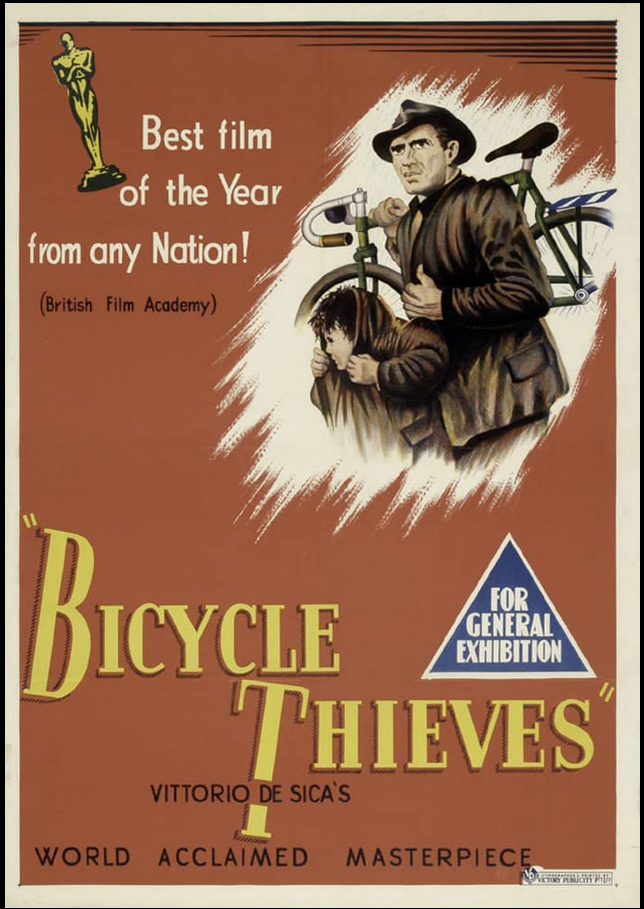
Bicycle Thieves is one of the masterpieces of the so-called Italian cinematic neorealism that generated actors and directors of the stature of Vittorio de Sica, among others, for example, and who is the director of this film, considered for many years as one of the ten best films of all time.
In some Latin American countries it was shown under the name Ladrones de Bicicletas and in others in the singular as Ladrón de Bicicletas.
The film is based on the story written by Luigi Bartolini in 1945, in the aftermath of the Second World War and takes place in the process of reconstruction of European society and economy (and especially Italian) where the bicycle represents for many people an indispensable element of work, as is the case of the protagonist of the film.

Ladrones de Bicicletas es una de las obras cumbres del llamado neorealismo cinematográfico italiano que generó actores i directores de la talla de Vittorio de Sica, entre otros, por ejemplo y que es el director de esta película, considerada durante muchos años como una de las diez mejores películas de todos los tiempos.
En algunos países de Hispanoamérica fue exhibida con el nombre de Ladrones de Bicicletas y en otros en cambio al singular como Ladrón de Bicicletas.
La película está basada en la historia escrita poir Luigi Bartolini en el año 1945, en postrimerías de la Segunda Guerra Mundial y se desarrolla en ese proceso de reconstrucción de la sociedad y la economía europeas (y especialmente italiana) donde la bicicleta representa para muchas personas un elemento indispensable de trabajo, como es el caso del protagonista de la película.
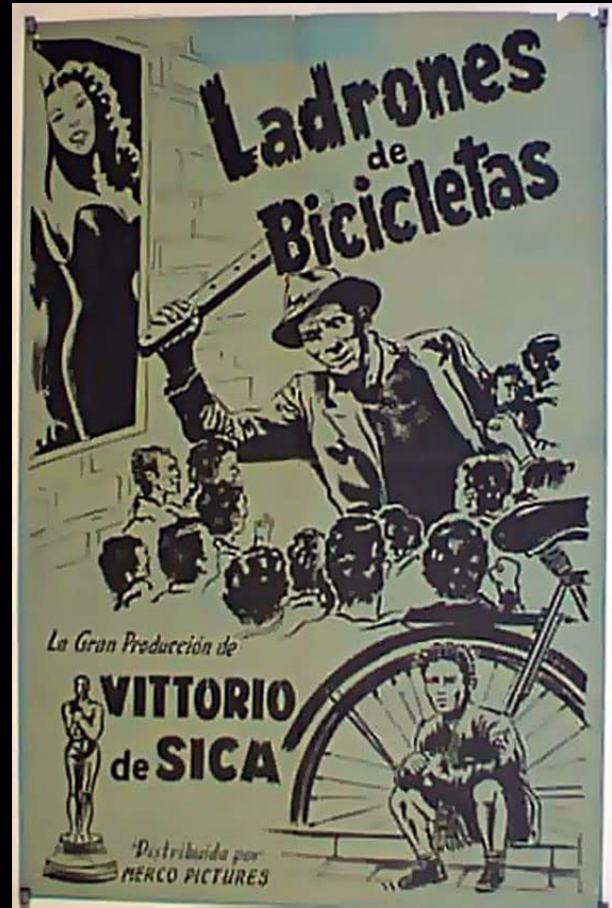

The context of the film is set in 1948 (three years after the end of the war) when the factories begin to develop their activity with a certain normality and the first social and trade union conflicts begin.
In fact, the main protagonist, Antonio Ricci (played wonderfully by Lamberto Maggiorani) is an unemployed worker who has found a temporary job for which the use of bicycles is indispensable.

El contexto de la película se sitúa en el año 1948 (a tres años de finalizada la guerra) cuando las fábricas comienzan a desarrollar su actividad con cierta normalidad y comienzan también los primeros conflictos sociales y sindicales.
En efecto, el protagonista principal, Antonio Ricci (interpretado estupendamente por Lamberto Maggiorani) es un obrero en paro que ha encontrado un trabajo temporáneo para el cuúl el uso de la bicicleta es indispensable.

Italy is living the post-war situation in which finding a job is a great achievement. And Antonio (who is unemployed due to union conflicts) finds it in the form of pasting advertising posters in the streets of Rome, but to his misfortune he is robbed on the first day of work while he is pasting a poster for a film advertisement. At that precise moment his odyssey begins as he has been robbed of his only means of support to feed his family.
At this point he only has to go through the streets of Rome and especially the areas around the place where his precious bicycle has been stolen, Porta Portese and Piazza di Vittorio, but the area to cover is too large and so he asks for help from his son Bruno and his colleagues in the garbage collection union who give him a hand in the search, although the bike has probably already been dismantled and sold for parts as spare parts.
At a certain point he finds a homeless man who has witnessed the robbery, follows him to a soup kitchen and asks him if he has not seen the criminals but the homeless man, immersed in his own thoughts and food, does not answer him.
Irony of fate, when he leaves the soup kitchen, he finds the man who stole his bicycle, but he is defended by his friends and manages to escape.
Desperate Antonio goes first to a psychic who takes the money for the consultation and practically takes him for a joke by saying "either you find her now or you will never find him" and then to the police (carabinieri) who tell him that without proof they can do nothing.
Back home empty-handed Antonio and his son Bruno find a bicycle that no one seems to be guarding. Desperate Antonio tries to steal it but immediately the owner's screams make the police come and only the disconsolate cry of his son Bruno makes them not to take him to jail.
As the first twilight of the night falls, Antonio and his son, dejected, return home, without the bicycle and the father with the weight on his conscience of having placed himself on the same level as the thieves of his bicycle in trying to do justice and recover by his own hand what had been stolen from him.

Italia vive la situación de posguerra en la que encontrar un trabajo es un gran logro. Y Antonio (que se encuentra en situación de paro por conflictos sindicales) lo encuentra bajo la forma de pegar carteles de publicidad en las calles de Roma, pero para su desgracia se le roban en el primer día de trabajo mientras está pegando un cartel de una publicidad cinematográfica. En ese preciso momento comienza su odisea ya que le han robado el único medio de sustentamiento para dar de comer a su familia.
A este punto solo le quedan recorrer las calles de Roma y espcialmente las zonas aledañas al lugar donde le han robado su preciada bicicleta, Porta Portese y Piazza di Vittorio, pero la superficie a cubrir es demasiado grande y por ello pide ayuda a su hijo Bruno y a sus compañeros del sindicato de recolección de la basura quienes le dan una mano en la búsqueda, aunque probablemente la bicicleta ya ha sido desmontada y vendida por partes como repuestos de recambio.
A un cierto punto encuentra a un vagabundo que ha presenciado el robo, lo sigue hasta un comedor social y le pregunta si no ha visto a los delincuentes pero el vagabundo sumido en sus propios pensamientos y en la comida no le contesta.
Ironía de la suerte al salir del comedor encuentra a quien le robó la bicicleta pero éste se hace defender por sus amigos y logra escapar.
Desesperado Antonio va primero a una vidente quien le saca el dinero de la consulta y prácticamente le toma el pelo al decirle "o la encuentras ahora o no lo ancontrarás nuca" y luego hasta la policía (carabinieri) quienes le dicen que sin pruebas no pueden hacer nada.
De regreso a casa con las manos vacías Antonio y su hijo Bruno encuentran una bicicleta a la que nadie parece custodiar. Desesperado Antonio trata de robarla pero en seguida los grtios del dueño hacen acudir a la policía y solo el llanto desconsolado de su hijo Bruno hace que no lleven a la cércel.
Mientras caen las primeras penumbras de la noche Antonio y su hijo, abatidos, regresan a casa, sin la bicicleta y el padre con el peso sobre su consciencia de haberse colocado en el mismo nivel de los ladrones de su bicicleta al tratar de hacer justicia y recuperar por mano propia aquello que le había sido robado.

Lamberto Maggiorani: Antonio Ricci
Enzo Staiola: Bruno Ricci
Lianella Carell: Maria Ricci
Elena Altieri: patrona de caridad
Gino Saltamerenda: Baiocco
Giulio Chiari: atacante
Vittorio Antonucci: Alfredo Catelli
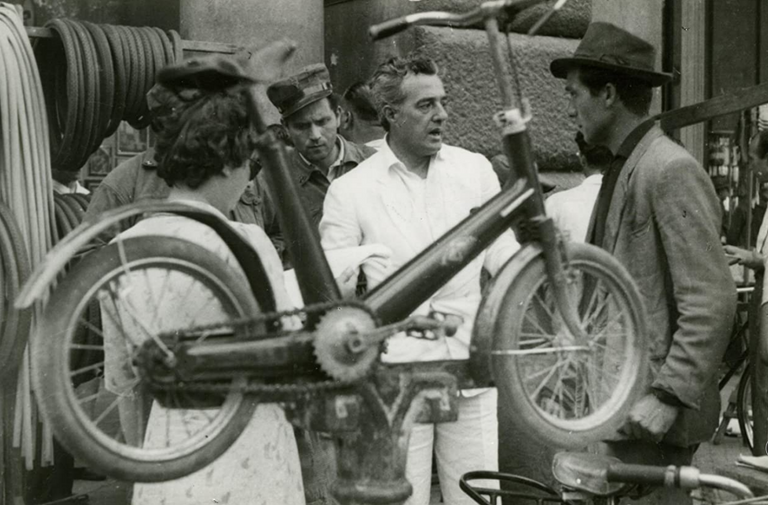

Vittorio de Sica had been directing for less than a decade when he made Bicycle Thief, transforming it - like many of his other works - into a masterpiece of Italian neorealism that at that time, towards the end of the 1940s, was taking its first steps, showing us post-war Italy with the harshest and most sensitive aspects of a society trying hard to move forward.
Vittorio de Sica's films are hard, bitter, but always poetic. In this case he shows unemployment, the soup kitchens to which so many Italians must go to survive, the church and its relationship with politics and communism that begins to take root on Italian soil through the unions, especially in the portals, in short, De Sica shows us through the film of an incredible aesthetic beauty and an overflowing humanity, the Italy that suffers day by day after the war and before the migratory wave that spread throughout the world, as well as at the end of the First World War.
Rarely with such limited resources was so much shown and told in a cinematographic work, making it one of the greatest films in the history of cinema.

Vittorio de Sica hacía menos de una década que dirigía cuando hizo Ladrón de Bicicletas, transformándola -al igual que muchas de sus obras restantes- en una obra maestra de neorealismo italiano que en ese momento, hacia fines de la década del cuarenta, estaba dando sus primeros pasos, mostrándonos la Italia del posguerra con los aspectos más duros y sensibles de una sociedad que con mucho esfuerzo trata de seguir adelante.
Las películas de Vittorio de Sica son duras, amargas, pero siempre poéticas. En este caso muestra el desempleo, los comedores públicos a los que deben acudir tantos italianos para sobrevivir, la iglesia y su relación con la política y el comunismo que comenza a sentar sus raíces en suelo italiano a través de los sindicatos especialmente portuales, en pocas palabras De Sica nos muestra a través del film de una uncreíble belleza estética y una humanidad desbordante, la Italia que sufre dia a dia después de la guerra y antes de la oleada migratoria que se expandió por todo el mundo, al igual que a la finalización de la Primera Guerra Mundial.
Pocas veces con recursos tan limitados se mostró y se contó tanto en una obra cinematográfica constituyéndola en una de las grandes películas de la historia del cine.
Film Writers Circle Medal for best foreign film.
Oscar Awards : Honorary Award. Voted by the Academy's Board of Governors as the most outstanding non-English language film released in the United States during 1949; 1950.
Golden Globes : Best Foreign Film, Italy; 1950.
National Board of Review : NBR Award, Best Director, Vittorio De Sica; Best Motion Picture (any language), Italy; 1949.
New York Film Critics Circle Awards : Best Foreign Language Film; 1949.13.
BAFTA Awards : Best Film from any Source; 1950.
Locarno International Film Festival, Switzerland: Special Jury Prize, Vittorio De Sica; 1949.
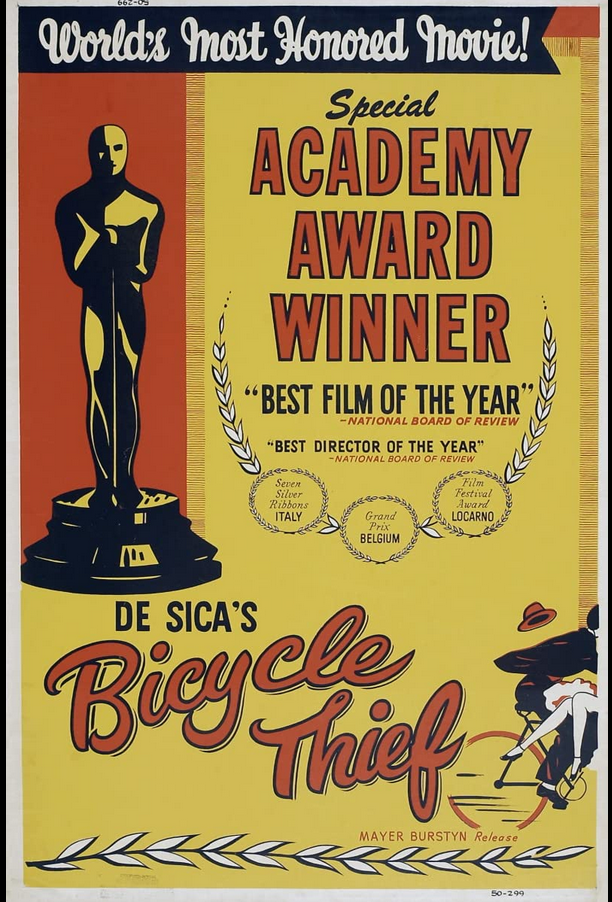
- Medalla del Círculo de Escritores Cinematográficos a la mejor película extranjera.
- Premios Óscar : Premio Honorario. Votado por la Junta de Gobernadores de la Academia como la película de lengua no inglesa más destacada lanzada en los Estados Unidos durante 1949; 1950.
- Globos de Oro : Mejor Película Extranjera, Italia; 1950.
- National Board of Review : Premio NBR, Mejor Director, Vittorio De Sica; Mejor película (cualquier idioma), Italia; 1949.
- Premios del Círculo de Críticos de Cine de Nueva York : Mejor película en lengua extranjera; 1949.13
- Premios BAFTA : Mejor Película de cualquier Fuente; 1950.
- Festival Internacional de Cine de Locarno , Suiza : Premio especial del jurado , Vittorio De Sica; 1949.
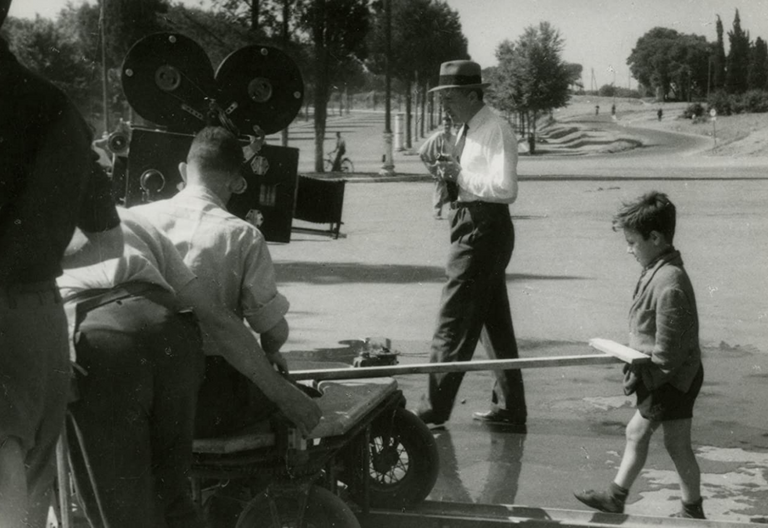


Sources consulted (my property) for the preparation of this article. Some paragraphs may be reproduced textually.
Fuentes consultadas (de mi propiedad) para la elaboración del presente artículo. Algunos párrafos pueden estar reproducidos textualmente.
| Argentina Discovery. |  |
|---|---|
| Galería Fotográfica de Argentina. |  |
| Viaggio in Argentina. |  |
| Patagonia Express. |  |

Upvoted. Thank You for sending some of your rewards to @null. Read my last posts to make sure that BLURT burning is profitable for you. Before using this bot please make sure your account has at least 100 BP. Get more BLURT:
@ mariuszkarowski/how-to-get-automatic-upvote-from-my-accounts@ blurtbooster/blurt-booster-introduction-rules-and-guidelines-1699999662965@ nalexadre/blurt-nexus-creating-an-affiliate-account-1700008765859@ kryptodenno - win BLURT POWER delegationNote: This bot will not vote on AI-generated content
Thanks!
It is a pleasure for us to share our best wishes and congratulations. You have been given a virtual hug by the curation account @newvisionlife and manually curation by @OneRay.
Life never ends and there are new ways to see it. Tell us yours in our community
Es un placer para nosotros compartir nuestros mejores deseos y felicitaciones. Usted ha recibido un abrazo virtual de la cuenta de curación @newvisionlife y curado manualmente por @OneRay
La vida nunca termina y hay nuevas formas de verla. Cuéntanos la tuya en nuestra comunidad
Gracias a @newvisionlife por haber seleccionado mi post para ser curado y por haber curado manualmente el post mi agradecimiento va también a @OneRay.